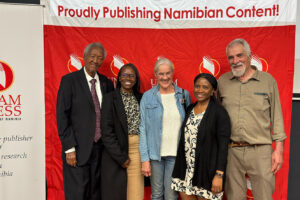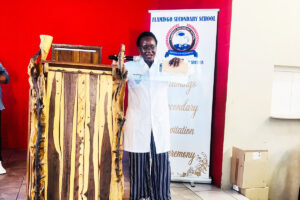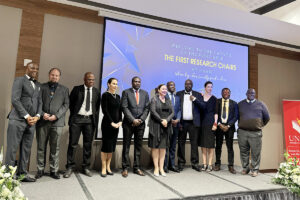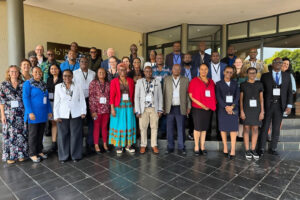UNAM produces the country’s third entomologist: Rosalia Joseph
Born in a region rampant with malaria, Rosalia Joseph (26) didn’t dream of having her master’s degree research work contribute to changes on how the country employs malaria control interventions. But, it actually did, and effectively too, to the people’s health benefit in the northern regions of Namibia.
Entomology is the study that is concerned with how insects transmit diseases to humans. Medical entomologists in Namibia, are rare to come by. Destined to graduate in April 2021, Rosalia is the first locally trained female medical entomologist in the country. She makes up a total of only three locally qualified experts, amongst them is the former health minister, Dr Richard Nchabi Kamwi – a doctor of philosophy graduate from the University of Namibia, 2005.
Changes that came with the research
In Namibia, especially in the northern regions, indoor residual spraying (IRS) and long-lasting insecticidal nets (LLINs), were used as primary malaria vector control interventions, since 1965 and 2005, respectively. However, a type of mosquito that spreads the parasite that causes malaria, started to be resistant to the insecticide the country uses.
“I studied, using WHO bioassay tubes and cones, the susceptibility status and composition of Anopheles mosquitoes and the efficacy of indoor residual spraying in northern Namibia,” said the Etomba Village-born scientist. Etomba is a village in Ohangwena Region.
“My findings showed that some mosquitoes were less resistant to a different insecticide rather than the one in use. As I was embedded with the Ministry of Health & Social Services team in Oshakati, we shared these results at national level and after several discussions, a change in policy on alternative insecticides for IRS was implemented in Namibia.” The alternative insecticide is also suitable for spraying on zinc, modern and traditional structures.
More entomologist needed
Dr Kamwi welcomed the new medical entomologist to the club: “Hearty congratulations to Rosalia, and I would like to welcome her to the team of experts in eliminating malaria in Namibia and beyond,” said the former health minister. In the same breath, he applauded her supervisor, Professor Mumbengegwi, for making the nation proud of these proceedings.
“I would also like to recommend to the government to create employment opportunities for medical entomologists since this is a critical position in the Elimination 8 Initiative in southern Africa,” Dr Kamwi added. He is currently the Ambassador for the SADC Malaria Elimination 8 countries, a member of the RBM board, and also a Malaria Champion for Africa CDC.
According to Professor Mumbengegwi, who has supervised as many as 25 postgraduate research students, Rosalia was one of his best. He supervised Rosalia with Dr Seth Eiseb. “I look forward to her doing her PhD and mentoring other young researchers,” he said. “Doing research is like being on a rollercoaster with many highs and lows, but working with Rosalia on her research was easy because she is driven, conscientious and international”.
Where to from here
For Rosalia, the work is not done as yet. “My focus now turns to eliminate malaria in Namibia by 2030, while working on cross-border malaria research in southern Africa,” Rosalia declared.
On her successful journey, she acknowledges having worked seamlessly with the health ministry.
“I worked with a number of partners too, from the National Vector-borne Disease Control Programme (NVDCP), the University of California in San Francisco, University of Notre Dame and Clinton Health Access Initiative (CHAI) in the United States to the Kenya Medical Research Institute (KEMRI) and Wits University,” she recounted.

“And of course, last but not least, special thanks to my crew at the UNAM Biomedical Lab, and dedicated staff in the Multidisciplinary Research Centre, for being there for me, every step of the way.”
10 years from now, she wishes to lead a broad range of research on other vector-borne diseases that do not only affect humans but animals as well. Rosalia has, since February 2021, joined the University of Namibia, as a Researcher at the Multidisciplinary Research Centre. She completed a Bachelor of Science in Environmental Biology & Geology (Honours) (2016) at UNAM.





